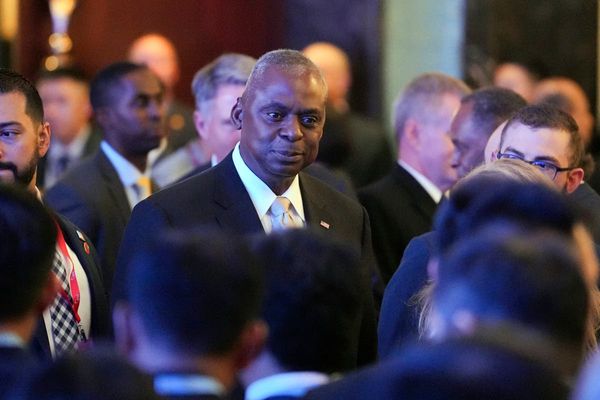
Against the backdrop of demonstrations against Israel’s war in Gaza on college campuses, the White House and Congress have announced a string of policies and commitments aimed at addressing what Joe Biden warned was a “ferocious surge of antisemitism” in the United States.
Antisemitism was on the rise in the US before Hamas attacked Israel on 7 October, killing roughly 1,200 people and taking another 250 hostage. But the ensuing war has exacerbated the problem, with the law enforcement officials recording a spike in threats against Jewish Americans.
Several of the proposals coming out of Washington DC have converged around college campuses, where hundreds of students have been arrested as part of pro-Palestinian demonstrations against Israel’s ongoing offensive in Gaza, which has killed tens of thousands of Palestinians and caused catastrophic levels of hunger.
Many Jewish students have said that rhetoric common to the protests – for example, their denunciations of Zionism and calls for a Palestinian uprising – too often veers into antisemitism and poses a threat to their safety. A number of Democratic and Republican lawmakers, as well as the president, have echoed their fears, condemning documented instances of antisemitism on campus.
But critics say some of the actions and polices under consideration threaten free speech and are part of a broader effort to silence legitimate criticism of Israel.
“The view that these encampments, these student protests, are per se antisemitic, which I think some people have, is leading to very aggressive repression,” said Genevieve Lakier, a professor of law at the University of Chicago law school and an expert in the first amendment. “I also think it is incorrect, particularly when the student movement is being populated and led in many ways by Jewish students.”
***
The wave of student activism against the war in Gaza has renewed a charged debate over what constitutes antisemitism.
Many supporters of Israel say the situation on college campuses validates the view, articulated in 2022 by the Anti-Defamation League’s chief executive, Jonathan Greenblatt, that “anti-Zionism is antisemitism”. But the Jewish and non-Jewish students involved with campus protests say their critiques of Israel, and its rightwing government’s prosecution of the war, are legitimate political speech that should not be conflated with antisemitism.
In remarks at a Holocaust remembrance ceremony at the Capitol last week, Biden vowed to leverage the full force of the US government to fight hate and bigotry against Jews and outlined specific policy steps his administration was taking to confront antisemitic discrimination in schools and universities.
The debate is also playing out on Capitol Hill, where the Senate is considering a bill that would codify into federal law a definition of antisemitism adopted in 2016 by the International Holocaust Remembrance Alliance (IHRA), an intergovernmental organization based in Stockholm.
The IHRA defines antisemitism as “certain perception of Jews, which may be expressed as hatred toward Jews”. But it also includes several modern examples of antisemitism that alarm free speech advocates, among them “denying the Jewish people their right to self-determination”, claiming Israel’s existence is a “racist endeavor” and “applying double standards” to Israel that are not expected of other countries.
Supporters say the bill, known as the Antisemitism Awareness Act, is critical.
“We really believe it’s the single most important thing that Congress could do right now to help bring under control the rampant antisemitism we’ve seen on campus,” said Eric Fingerhut, president and CEO of the Jewish Federations of North America, which is lobbying in support of the legislation.
But opponents are urging the Senate to block the bill, recently approved by the House in a resounding 320-91 vote,
“In a democratic society, we’re allowed to engage in political advocacy and political protests that criticize any government in the world,” said Tyler Coward, lead counsel for government affairs at the Foundation for Individual Rights and Expression (Fire). “Taking some ideas off the table for one country is classic viewpoint discrimination that the courts just won’t tolerate.”
Fire has opposed iterations of this bill since it was introduced in 2016, citing concerns that the definition is “vague, overbroad, and includes criticism of Israeli government policy”.
If enacted, the Department of Education would be required to use the definition when conducting federal investigations into alleged incidents of discrimination against Jewish students. Colleges or universities found to have violated the law could be stripped of federal funding.
Fingerhut said free speech concerns were a “red herring”, arguing that the legislation was designed to give the Department of Education and academic institutions a “clear” standard for punishing acts of antisemitism.
But the bill has drawn condemnation from pro-Palestinian advocacy groups who view it as an attempt to quash their ascendent movement.
The Council on American-Islamic Relations (Cair) condemned the legislation as a “one-sided, and dishonest proposal about campus antisemitism that ignore[s] anti-Palestinian racism and conflates criticism of the Israeli government with antisemitism”.
Since the Israel-Hamas conflict began seven months ago, the law enforcement officials have also warned of a rise in threats against Muslim and Arab Americans, and advocates are monitoring an uptick in Islamophobia on college campuses.
One of the effort’s most notable opponents is a lawyer and scholar who authored the IHRA’s definition of antisemitism. Kenneth Stern, who is the director of the Bard Center for the Study of Hate and is Jewish, has said the definition was created with the purpose of collecting better data on antisemitism across borders, not to be turned into a campus hate-speech code.
“In my experience, people who care about campus antisemitism, and want to do something about it, sometimes advocate things that feel good … but actually do great harm,” he testified in 2017 against a previous iteration of the bill.
That version stalled, but two years later, proponents won a significant victory when Donald Trump issued a sweeping executive order instructing federal agencies to use the IHRA definition when investigating civil rights complaints.
In recent months, alarm over rising antisemitism – which Jewish groups say is not unique to college campuses – appears to have broadened support for the Antisemitism Awareness Act. Still, the vote split House Democrats, including some Jewish members of the caucus, who disagreed over whether it was the right legislative fix.
The representative Josh Gottheimer, a New Jersey Democrat who sponsored the House bill, said it was a necessary response to the “tidal wave” of antisemitism, while Maryland representative Jamie Raskin, a Democrat and constitutional scholar, voted for the bill but called it “essentially symbolic”.
“At this moment of anguish and confusion over the dangerous surge of antisemitism, authoritarianism and racism all over the country and the world, it seems unlikely that this meaningless ‘gotcha’ legislation can help much – but neither can it hurt much,” Raskin said.
But the representative Jerry Nadler of New York, who describes himself as “an observant Jew, a proud Zionist, a strong supporter of Israel”, voted against the bill. In an op-ed for the Washington Post, Nadler explained that he supported the sentiment behind the bill, but feared the it could “sweep in perfectly valid criticism of the state of Israel that, alone, does not necessarily constitute unlawful harassment or antisemitism”.
“I want my Jewish community to feel safe on campus, but I do not need it shielded from controversial views simply because those views are unpopular,” he wrote.
The legislation has also drawn opposition from some conservatives over concerns that it could be used to persecute Christians who express the belief that Jews killed Jesus, an assertion widely regarded as antisemitic that historians and Christian leaders, including Pope Benedict, have rejected.
Civil liberties advocates are also raising concerns about an anti-terrorism bill approved overwhelmingly by the House last month in the wake of Iran’s unprecedented missile assault on Israel. Proponents say the measure is a necessary guardrail to prevent US-based organizations from providing financial support to Israel’s enemies. But critics have called it an “Orwellian bill aimed at silencing nonprofits that support Palestinian human rights”.
***
Last week, Biden announced a series of actions that build on what the White House has called “the most comprehensive and ambitious US government effort to counter antisemitism in American history”.
It included new guidance by the Department of Education’s Office of Civil Rights, sent to every school and college, that outlines examples of antisemitic discrimination and other forms of hate that could lead to a federal civil rights investigation. Since the 7 October attack, the Department of Education has launched more than 100 investigations into colleges and public school districts over allegations of “discrimination involving shared ancestry”, which include incidents of antisemitism and Islamophobia.
The initiative also includes additional steps the Department of Homeland Security would take to help campuses improve safety.
Meanwhile, on Capitol Hill, House Republicans have vowed to use their majority to intensify scrutiny of antisemitism on college campuses, part of their election-year strategy to use the unrest as a political cudgel against Biden and the Democrats, who are deeply divided over the Israel-Gaza war.
Wielding their oversight powers, several House Republican chairs have announced plans to investigate universities where pro-Palestinian student protests have flourished. On Wednesday, a House subcommittee held a hearing, titled Antisemitism on College Campuses, in which Jewish college students testified that their university administrations had failed to stop antisemitic threats and harassment. And during a congressional panel last week, Republicans challenged the leaders of some of the nation’s largest public school systems to do more to counter antisemitism in their schools.
It follows a tense hearing on antisemitism with administration officials from some of the nation’s most prestigious universities that precipitated the resignations of the presidents of Harvard University and the University of Pennsylvania. A congressional appearance last month by Columbia University’s president, Minouche Shafik, escalated the antiwar protests at her school that then spread to campuses across the country.
“There are a lot of shades of McCarthyism as the House keeps calling people in to shame and name them, to spread moral panic,” said Lakier of the University of Chicago law school.
Facing enormous pressure from Congress and the Department of Education, as well as from students, faculty, donors and alumni, universities and colleges, Lakier argued, are collectively showing less tolerance for the pro-Palestinian student protests than they did for Vietnam war-era campus activism.
On dozens of university campuses, state and local police officers, sometimes in riot gear, have dispersed pro-Palestinian protesters, often at the request of university officials. As many as 2,400 people have been arrested during pro-Palestinian campus protests in recent weeks, while many students have been suspended or expelled.
“From a first amendment perspective, one hopes you learn from the past,” Lakier said, “but to be repeating it is distressing.”







